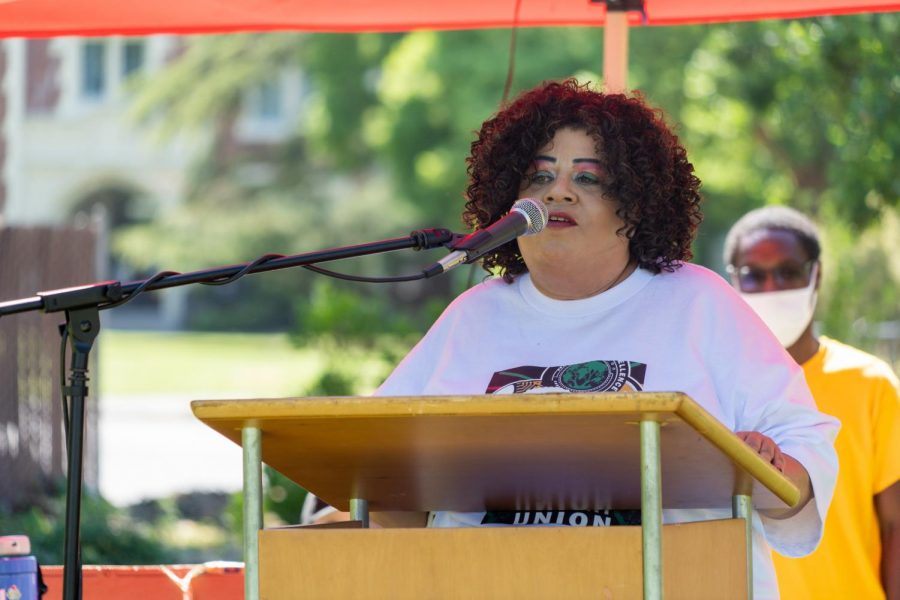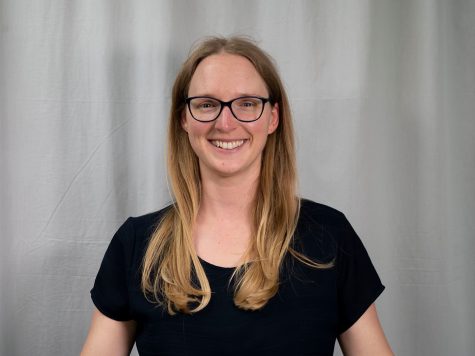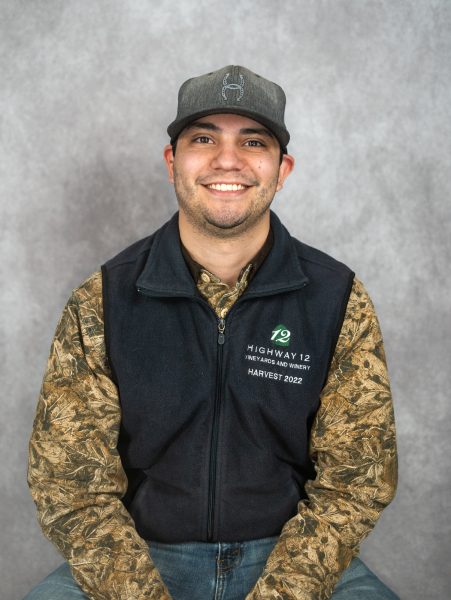The smell of sun-warmed grass permeated the hot May afternoon on Santa Rosa Junior College’s main campus front lawn. More than a hundred people filled the pools of shade under towering oaks in physically distanced groups, their low conversations muffled by masks as they awaited speakers to take the podium.
Student Body President Delashay Carmona Benson spoke here last summer for a Black Lives Matter protest and will continue taking the podium here until her demands are met.
She greeted the crowd with a simple hello. There was little audible reply from the crowd, perhaps due to the heat of the day or the weight of topics already discussed at the May 5 BlackOut protest.
“Well I’m a little bit more popular than that. Hello,” Benson tried again with characteristic levity and perseverance. This time the crowd lifted up an enthusiastic reply.
Now that she had their attention, she made her demands clear. After a year of talking with SRJC leadership about changes to support diverse students on campus, Benson was ready for action.
“I want dates, timelines,” Benson said. “If we’re going to have a [Black student success] center, what day is it going to open and what time? We are tired of talking. There’s nothing else for us to tell you. You heard our demands.”
“And as a matter of fact,” Benson continued, “you woke up human, so you already know what it is to be human. So all we’re asking is that you turn on your human. And act like you’re human.”
As an Afro-Latina mother of seven and re-entry student who started college in her 50s and in a wheelchair, Benson herself has plenty of human experience to turn on.
Benson’s diverse identity, compassionate drive and ability to turn slick phrases into real action make her a fitting leader to shepherd the cultural shift she demands at SRJC.
“I ran on the ticket of advocacy, diversity, inclusion and equity for all, and I meant it,” Benson said. “That’s who I am, and that’s who I’ve been my whole life.”
From high school dropout to valedictorian
Benson’s own path to college included a detour at age 17 when she got married and dropped out of her high school in a Chicago suburb.
She thought she was pretty cool with her own apartment and new life in Mississippi, until the local school principal ran into her one weekday afternoon at a grocery store and asked why she was not in school.
Benson replied emphatically that she had quit.
Upon hearing her non-Southern accent, the principal asked where she was from and proposed a compromise.
“Can you come to school for just one week?” he asked. “Because I think I know what’s wrong with you.”
Benson responded with a quintessential teen “whatever” but went to the school anyway.
She later graduated as valedictorian.
The difference, Benson said, was the culturally competent teachers in the Mississippi school system. Black teachers taught her about Black people she had never heard of while attending high school in the predominantly white Chicago suburb where she grew up.
From personal pronouns to student government
Now entering her second term as SRJC’s student body president, Benson wants one experience for all students: to see themselves represented in curriculum and by teachers who share their identity or who are trained in diversity.
But this is not the issue that initially inspired her to get into politics. It was pronouns.
Benson started at SRJC in her 50s after postponing college for decades to care for her family and homeschool her children.
In her first classes, Benson witnessed repeated public exchanges about preferred pronouns, with well-meaning professors accidentally forgetting pronouns and students uncomfortably reminding them.
As a mother of a transgender son, Benson wondered why students could not just select their personal pronouns on their college application, like the option for preferred name, so instructors would know from the start.
The pronoun issue combined with concerns about LGBTQ student safety in campus bathrooms drove Benson to attend Student Government Assembly meetings every week in Fall 2019.
“Finally they’re like, ‘You’re so outspoken. You need to be on SGA,’” Benson said.
“They mentioned Petaluma, and I didn’t even know we had a school in Petaluma. Petaluma came off as sort of the underdog, which is my jam,” Benson said, citing her start as Petaluma vice president of clubs.
In Spring 2020, Benson lost the race for student body president to incumbent and former Oak Leaf Editor-in-Chief Dakota McGranahan.
However, in September 2020, SRJC administration appointed Benson to student body president after removing McGranahan from office after an investigation into bullying and campaign violations.
Benson wanted to reorient the sitting SGA officers from their clique-ish slates to the business of student governance following that stressful election season.
“If you are here for Delashay, please leave. Please resign right now,” Benson said to the SGA officers. “If you are here for Dakota, please leave. Please resign right now. If you guys are here for the students at SRJC, please remain in your Zoom, and let’s go.”
Benson also wanted to make clear that as student body president, she is president for all students and not just Black students, given her concurrent role as co-president of the Black Student Union. To this end, she made sure there was a separate assembly member from BSU to represent BSU demands at SGA meetings.
Benson thinks these moves helped her gain respect on SGA. This respect is apparent from comments by Anetra McCartney, Santa Rosa vice president of clubs and next year’s student trustee to the SRJC Board of Trustees.
“She takes in people and she doesn’t even regard them as student government sometimes; she just regards them as family,” McCartney said. “She’s just someone that you look up to and can ask for life experience, because she has a lot of wisdom to share.”
Benson’s authenticity resonates with students outside of SGA, too.
“[Students will] remember her, always,” said Joshua Mandela Poinsett, a BSU member. “Everyone leaves an impression if they’re original or real. She’s always herself.”
Goals for SRJC
Following an uncontested election for student body president this spring, Benson plans to turn the innumerable committee meetings of this school year into actions for next year.
“Sometimes it’s even hard to get to that point of, ‘What can we do in a given year?’” said Zack Miranda, student government programs coordinator, whose job is to guide SGA policies and procedures.
“That’s never been a problem that Delashay’s had. Day One, she had a whole list of things she wanted to tackle,” Miranda said.
One thing Benson wants to tackle is the option for pronoun selection on SRJC’s registration portal, a move furthered by the passage of a resolution in the Student Senate of California Community Colleges written by McGranahan and another SGA officer in Spring 2020.
Other plans include advocating for student privacy regarding cameras and Zoom classes; improved safety around pandemic protocols, fire season, active shooter scenarios and bathrooms; less homework and more interaction with instructors; and cultural competence training for all SRJC leadership, staff, faculty and students.
She will also continue to support BSU’s demands.
“I think the school did step up,” Benson said. “There are changes. A lot of our demands were met. But I can also say that the main ones have yet to come.”
These larger demands include creating a Black/Ethnic Studies Department and Black student success center. In working on these projects, Benson has learned that even something like an African linguistics course can take up to two years to develop and approve.
“It’s hard on both ends. We want to be respectful to the administration, but also, we don’t want to be pacified,” Benson said.
Student Equity and Achievement Administrative Assistant, Black Leadership Association Collective Co-President and BSU Advisor Regina Mahiri said Benson has grown as a leader in learning to work with the bureaucracy at SRJC, noting that Benson seeks and implements feedback like an athlete.
“You gotta know when to be a hurricane and when to be a quiet storm; knowing when to be very vocal and also knowing when to sit, listen, reflect and then speak,” Mahiri said.
Recovering from the pandemic and looking to the future
Benon’s biggest plans for shining the spotlight on her underdog Petaluma campus fell apart overnight when the COVID-19 pandemic hit last spring.
The pandemic also had devastating effects on her personal life. She lost her exercise outlet at the YMCA’s heated pool, a nightly routine that helped her lose 200 pounds and start to walk again.
“I got really depressed,” Benson said. “But I got an emotional support dog. He’s been the love of my life.”
Her service dog, Ali, so named “because he is a champ,” is an 18-week-old French bulldog with a wardrobe larger than Benson’s own.
In addition to Ali, Benson said she could not have gotten through this year without the support of her SGA colleagues and advisors.
To her fellow students, Benson said she is proud of them for sticking out one of the most challenging years in history, considering the pandemic, job losses, Black Lives Matter protests, wildfires, contentious presidential election, storming of the U.S. Capitol, remote learning and the uncertainty around vaccine rollout.
“Have you ever thought about everything that’s happened this year? It is the worst time in history. And here we are Sonoma Strong, SRJC strong,” Benson said. “I’m so proud of every student that stayed in school this year.”
Benson, a humanities major, dreamed of transferring to Mills College, an Oakland liberal arts school famous for fostering powerful female leaders, before the school abruptly announced it will no longer accept new undergraduate students.
For now, Benson’s focus remains on SRJC and Santa Rosa. She plans to run for student trustee after her next term as SGA president so she can see her actions through to completion with the Board of Trustees. Ultimately, she wants to sit on the Board of Trustees herself.
In the meantime, she will continue her studies and leadership in more than a dozen social justice groups on and off campus that fill her schedule from 8:30 a.m. to 8:30 p.m.
On just that one bright May afternoon, Benson motivated BlackOut attendees to pledge more than $10,000 in less than 10 minutes toward funding a Black student success center.
“I want people to realize there’s no age limit to go back and finish what you need to finish,” Benson said. “If you have to stop and raise kids, that’s what you do. Just don’t lose yourself along the track. Go back.”
Benson, whose educational future turned after a chance meeting with a high school principal in a Mississippi grocery store, wants to change the structures at SRJC to provide support for today’s struggling students.
“Some people might say I’m late. My answer to that is that I’m here,” Benson said.
At the end of the BlackOut protest, Benson invited attendees to participate in another community event she spearheaded.
“Because only in unity are we going to make these changes,” she said, adding, “P.S. when you come, bring your human with you.”
Student Government Association meetings are open to the public and currently run 3-5 p.m. Mondays over Zoom.






Athena l Weathers • May 20, 2021 at 10:13 am
its funny that you only interviewed those people of color when there was so many other people who are from all different walks of life. as our president said “Turn your human on” not “Turn your black on”. there needs to be more diversity when writing this article. as one of the organizers of this rally, I can tell you that this was not just for the people of color, it was for everyone. it makes me sad that the reporters didn’t interview more people that spoke at this event and get their view because they are part of different minorities and have pride in what they speak for and about.
James Domizio • May 20, 2021 at 1:30 pm
Hi Athena,
This was designed as a profile of SRJC Student Body President Delashay after her recent reelection, and was not intended as event coverage. We covered the BlackOut in a photo gallery earlier this month that you can see at this link.